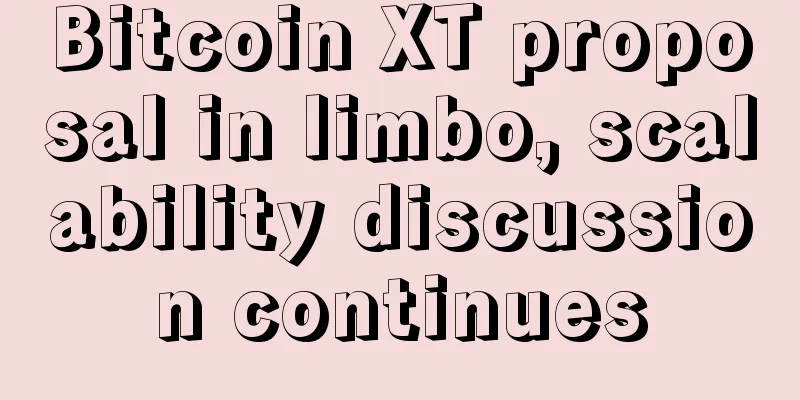Bitcoin XT proposal in limbo, scalability discussion continues

|
Today could have marked a significant day in Bitcoin’s history if a controversial alternative to the Bitcoin code had gained traction. But alas, that is unlikely. As many industry observers know, the Bitcoin open source community has been engaged in a months-long struggle to determine how best to increase the transaction capacity of the network, and as of January 11, those discussions are still ongoing. Initially, project developers Gavin Andresen and Mike Hearn stipulated that the Bitcoin XT program would be launched as early as January 11, when the larger 8MB block size would be introduced for users running the XT software. Others running the Bitcoin Core wallet will still use the 1MB block size. Regardless of these proposals, there is a consensus in the Bitcoin community that some changes to the blockchain are necessary, where users will be forced to more actively opt-in to paying for transactions processed on the blockchain, essentially making the stamp cost of each piece of mail more prominent. The current 1MB block size means that in the near future, the network may become seriously congested, leaving transactions delayed or even completely unable to trade. Such examples have already happened before, and spammers are typical representatives in the past. If enough Bitcoin users choose to adopt XT — or 75% to be more precise — Bitcoin Improvement Protocol 101 (BIP101) will go into effect, and the block size for those running that software will increase. You’ll see the block size double every two years from the current 1MB until it reaches 8MB. However, this did not happen. Today, only about 10% of node users worldwide have accepted the XT proposal. Despite support from prominent companies including Coinbase, BitPay, Circle and Blockchain, Bitcoin miners have largely stayed away.
When asked what the lack of consensus on the XT version is, Hearn, who is now less involved in the XT project, told CoinDesk in an email that he believes block capacity remains an issue for the bitcoin network.
He specifically pointed to the fact that bitcoin miners have shown a willingness to cooperate with decisions made by bitcoin core developers – the open source elite that oversees changes to the code.
He believes that "Bitcoin can no longer serve as a convincing decentralized system. No matter how well it works or how many influential users and merchants it has, they cannot tell the difference between it and other proprietary payment networks."
Hearn is now working with blockchain startup R3 to develop the technology for users through corporate financial institutions.
Too much, too fast?
Of course, if 75% of node users accept the XT solution after a period of time, BIP101 will still take effect. However, according to machine data and opinions in the industry, this possibility seems unlikely to occur.
“Most miners seem to have agreed to BIP101 too much, too quickly, and with inappropriate predictions about future block sizes,” said Jameson Lopp, a BitGo engineer. “Bitcoin has a difficult status quo — and XT has shown how difficult it is to overcome.”
Core developer BTCDrak agrees with this view, believing that the BIP101 proposal is too "radical", especially for miners , although they have long stated that they can operate 8MB blocks.
However, he cited the main reason for the lack of support:
“XT clients were rejected by miners and major enterprises due to lack of support, human resources and expertise to maintain and develop their software.”
In his comments, Andresen also told CoinDesk that bitcoin users should be more proactive in suggesting what software they want to run, echoing his call for the bitcoin network to support a variety of implementation tools.
He said : "Community members should tell software developers what kind of software they want to use, and if software developers cannot or do not meet their wishes, it is not too late to change the software."
Notably, Andresen also said he would publicly adjust his proposal or launch a new BIP proposal if necessary.
Competing Solutions
Despite the differing opinions, there seems to be general agreement that changes should be made to the transaction capacity of the Bitcoin network.
For supporters of this change, the fundamental question is whether it can be implemented, and more importantly, how and when it can be implemented.
There are other proposals, including one called “Segregated Witness” (commonly abbreviated “SegWit”) by Pieter Wuille, a Bitcoin Core maintainer and co-founder of Blockstream.
The plan will make transactions on current network nodes smaller, making a theoretical 1MB block equivalent to 4MB. This measure is roughly equivalent to reorganizing your wardrobe instead of choosing to buy a bigger wardrobe. The plan has attracted a lot of support since the Hong Kong Bitcoin Scaling Seminar last year.
Another proposal for a more modest block size increase, known as the “2-4-8” plan, has drawn interest from backers like BTCC, a Chinese bitcoin mining pool and exchange.
However, due to the different approaches, it is possible that both solutions can be implemented simultaneously.
|
<<: Suspect of Bitcoin extortion group DD4BC arrested
>>: The U.S. Government Should Destroy Bitcoin and Similar Technologies
Recommend
Ethereum Berlin Upgrade Announcement
Source | Ethereum Blog Author: Tim Beiko Quick Fa...
Wu Jihan’s computing power
today From co-founding a business to splitting up...
Is it good to have a bulge in the center of the forehead?
From the perspective of physiognomy, a face with ...
The location of moles and destiny-what does a mole on the ear mean
The moles on the ears can reflect a person's ...
What is the personality of a person with deep eye sockets? Is fate good or bad?
In life, we can see some people with deep eye sock...
How to solve the problem of a girl's broken palm
We often say that a man with a broken palm is ver...
Three types of men born to be busy and hardworking, are you one of them?
I'm clearly trying my best to work hard for m...
Blockai uses the Bitcoin blockchain to protect intellectual property, and copyright registration is permanently free
Blockai now allows web content creators to record...
DEFI user paid $36,000 in gas fees due to input errors. Can EIP-1559 solve the problem?
Ethereum fees have reached record levels. One Uni...
Versatile blockchain technology attracts mainstream media attention
When mainstream media began to publish positive r...
What does a woman with a mole under her nose look like?
As one of the traditional physiognomy techniques, ...
The fate of a person with a sunken Tianzhai Palace. Is it good or bad to have a sunken Tianzhai Palace?
We all know that the face is divided into twelve ...
The fate of a man with white eyes. Is it good for a man to have white eyes?
Men with white eyes tend to be impulsive If a man...
How to identify a bitch through face reading
We have discussed how to identify scumbags throug...
How much do you know about the meaning of moles on your hands?
1. There is a mole on the middle section of the m...









